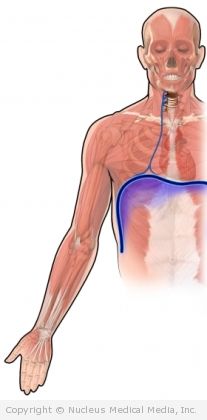(Singultus)
Hiccups – Definition
Hiccups are an episode of repeated, uncontrollable spasms of the diaphragm muscle. This results in an odd, sometimes uncomfortable gasping sensation and sound with each hiccup.
Hiccups – Causes
Everyone experiences hiccups at one time or another. Some common causes include:
- Eating a large meal
- Drinking carbonated drinks or alcohol
- Sudden change in temperature
- Emotional stress or excitement
Some conditions result in hiccups that persist for long periods of time and may be very difficult to control. Long-term hiccups may be caused by irritations of the nerves that control your diaphragm muscle. This may be due to:
- Something in your ear (such as a hair) touching your eardrum
- Sore throat
- A tumor, cyst, or goiter in your neck
- Gastroesophageal reflux
Conditions that affect your nervous system could also cause long-term hiccups, such as:
- Multiple sclerosis
- Meningitis
- Encephalitis
- Tumors
- Traumatic brain injury
Other possible causes of long-term hiccups include:
- Alcoholism
- Electrolyte imbalance
- Dehydration
- Kidney disease
- Certain medicines, including barbiturates, steroids, anesthesia, and tranquilizers
Hiccups – Risk Factors
Risk factors for hiccups include:
- Gender: males
- General anesthesia
- Having surgery
- Irritation to the nerve that stimulates the diaphragm (phrenic nerve)
- Certain conditions of the central nervous system or kidneys
Hiccups – Symptoms
Symptoms include:
- Repeated, uncontrollable spasms of the diaphragm muscle
- Uncomfortable gasping sensation and sound with each hiccup
When Should I Call My Doctor?
Call your doctor if your hiccups:
- Last for more than two days
- Are very painful or are interefering with your daily life (such as eating or sleeping)
Hiccups – Diagnosis
The doctor will ask about your symptoms and medical history, and perform a physical exam. If you have the hiccups, they will be evident during the exam. If the doctor is concerned that the hiccups may be caused by some underlying condition, you may need tests. These tests might include:
- Blood tests
- Liver function tests
- Chest x-ray — a test that uses radiation to take a picture of structures inside the body
- Computed tomography (CT) scan of the head, chest, and/or abdomen — a type of x-ray that uses a computer to make pictures of the inside of the body
- Echocardiogram — a test that uses high-frequency sound waves (ultrasound) to examine the size, shape, and motion of the heart
- Bronchoscopy — a thin, lighted tube inserted into the bronchial tubes to examine the lungs and air passages
- Upper endoscopy — a thin, lighted tube inserted down the throat to examine the stomach and intestine
Hiccups – Treatment
Many treatments for hiccups involve stimulating various nerves that may be involved. This can be done by:
- Eating granulated sugar
- Valsalva maneuver — holding your breath and bearing down, as you might when having a bowel movement
- Breathing into a bag
- Pulling on your tongue
- Lifting the uvula (the tissue hanging down in the back of your throat) with a spoon
- Assuming a knees-to-chest position
- Belching
- Purposefully gasping
- Relaxing completely with slow, controlled breathing
Some drugs may help resolve particularly troublesome hiccups, including:
- Chlorpromazine
- Seizure medicines
- Benzodiazepines
- Metoclopramide
- Baclofen
- General anesthesia
Hiccups – Prevention
It is not known why some people get hiccups. There are no sure ways to prevent developing this condition. However, if you are prone to hiccups, you might want to avoid:
- Overfilling your stomach
- Drinking carbonated beverages
- Experiencing sudden changes in temperature
- Drinking alcohol
- Becoming overexcited (including stress, intense emotion, heavy laughing, or crying)

